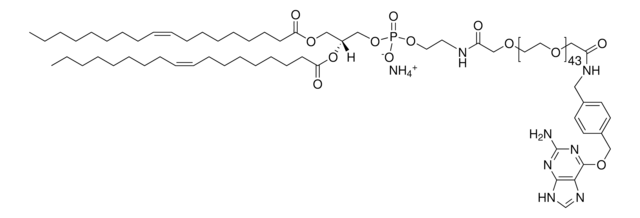890705C
Avanti
16:0-18:1 EPC (Cl Salt)
Avanti Research™ - A Croda Brand 890705C
Synonyme(s) :
1-palmitoyl-2-oleoyl-sn-glycero-3-ethylphosphocholine (chloride salt)
About This Item
Produits recommandés
Forme
liquid
Conditionnement
pkg of 1 × 1 mL (890705C-10mg)
pkg of 1 × 2.5 mL (890705C-25mg)
Fabricant/nom de marque
Avanti Research™ - A Croda Brand 890705C
Concentration
10 mg/mL (890705C-10mg)
10 mg/mL (890705C-25mg)
Type de lipide
transfection
cationic lipids
Conditions d'expédition
dry ice
Température de stockage
−20°C
Chaîne SMILES
O=P(OCC[N+](C)(C)C)(OC[C@]([H])(OC(CCCCCCC/C=C\CCCCCCCC)=O)COC(CCCCCCCCCCCCCCC)=O)OCC.[Cl-]
Clé InChI
SXRDCCSKGWBZFF-ISBKSCLYSA-M
Catégories apparentées
Description générale
Application
- as a cationic lipid to explore the change in organization and dynamics of a membrane-bound fluorescent probe in host membranes of varying charge
- in the preparation of small unilamellar cationic liposomes
- in a novel albumin-associated lipoplex formulation to evaluate the antitumoral efficacy of immuno-gene therapy and “suicide” gene therapy
Actions biochimiques/physiologiques
Conditionnement
Informations légales
Mention d'avertissement
Danger
Mentions de danger
Classification des risques
Acute Tox. 3 Inhalation - Acute Tox. 4 Oral - Aquatic Chronic 3 - Carc. 2 - Eye Irrit. 2 - Repr. 2 - Skin Irrit. 2 - STOT RE 1 - STOT SE 3
Organes cibles
Central nervous system, Liver,Kidney
Classe de danger pour l'eau (WGK)
WGK 3
Listes réglementaires
Les listes réglementaires sont principalement fournies pour les produits chimiques. Seules des informations limitées peuvent être fournies ici pour les produits non chimiques. L'absence d'indication signifie qu'aucun des composants n'est répertorié. Il incombe à l'utilisateur de s'assurer de l'utilisation sûre et légale du produit.
EU REACH Annex XVII (Restriction List)
Faites votre choix parmi les versions les plus récentes :
Certificats d'analyse (COA)
It looks like we've run into a problem, but you can still download Certificates of Analysis from our Documents section.
Si vous avez besoin d'assistance, veuillez contacter Service Clients
Déjà en possession de ce produit ?
Retrouvez la documentation relative aux produits que vous avez récemment achetés dans la Bibliothèque de documents.
Notre équipe de scientifiques dispose d'une expérience dans tous les secteurs de la recherche, notamment en sciences de la vie, science des matériaux, synthèse chimique, chromatographie, analyse et dans de nombreux autres domaines..
Contacter notre Service technique










